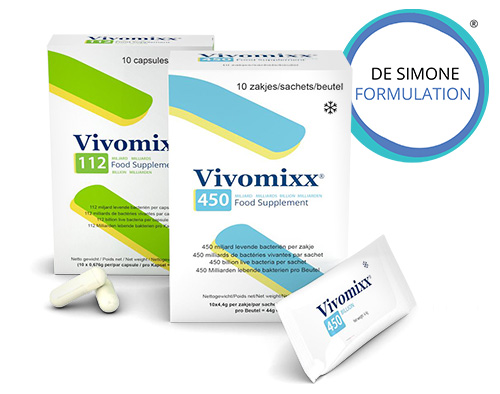Microbiome at all ages

Vivomixx for children
Each individual is born with a specific and unique microbiota. Initially sterile, the baby inherits the good and bad bacteria of its mother during birth and passage through the vaginal canal, and by breast milk. The microbiota slowly develops and by 3 years of age, the child can be said to have a mature intestinal flora that will accompany him throughout his life
Why our kids are more vulnerable?
A balanced microflora is made of a majority of healthy bacteria, including probiotics, which help digestion and assimilate nutrients. A healthy microbiota is important for the good physiological growth of children.
Some factors can alter the intestinal flora and trigger an imbalance in children:
- A bad intestinal health of the mother during pregnancy and the transmission of an imbalanced flora at birth
- Birth by cesaerean section which does not allow proper colonisation with the maternal flora
- Absence of breast feeding
- Nutrition and lifestyle
- Environmental factors
These imbalances can hinder the smooth development of the infant and of the child causing:
- Intestinal problems such as abdominal pain, cramps, colic, bloating, altered transit .
- Fatigue, allergies
“Good bacteria are important for good growth”

Vivomixx for adults
In our minds, bacteria are usually linked to disease, however our body is full of bacteria working hard for our good health. In healthy adults, the intestinal microflora naturally finds a fair balance between the good and potentially harmful bacteria. The challenge for good health lies in maintaining such balance.
The intestinal balance put to the test
Some people are lucky enough to inherit a diversified intestinal flora, rich in good bacteria contributing to their well-being and health. Some are not so lucky and inherit a less balanced flora which may lead to gastrointestinal disorders. Together with these genetic aspects, many other situations can affect this balance which is so important for our health. We know that nutrition plays a fundamental role and that antibiotics may damage our intestinal flora, but what we may not know is that regular and moderate exercising will counteract the negative impacts and intestinal imbalance that stress, anxiety and depression may cause.
The consequences of microbiota imbalance
A reduction of the good bacteria and increase of pathogenic bacteria leads to malfunctioning of our gut, called dysbiosis.
This state may trigger gastrointestinal disorders such as abdominal pain, cramps, bloating, excess of gas and altered transit. Another consequence of this dysbiosis is the possible transfer of such pathogenic bacteria to other body areas, leading for example to vaginal or urinary tract infections.
Dysbiosis alters the intestinal barrier, which may lead to possible food intolerance, allergies and chronic intestinal disorders.
How to maintain this balance?
In order to maintain a healthy intestinal flora, we must take good care of our lifestyle and eat food rich in pre and probiotic, avoid antibiotic treatments if possible, practice sports and relax!
When there is a serious dysbiosis, such as after antibiotic treatment or other event which disrupts the balance of our microbiota, a probiotic seems an appropriate approach to integrate friendly bacteria to help protect our organism.
“It’s very important to maintain the balance of your intestinal microflora to keep healthy!”

Vivomixx for seniors
Being a senior today means being active most of the time, not necessarily being grandparents, sometimes living in a family context with children in the home. Medical and social advances made it possible for seniors to live a much more active life than previous generations. In our society where the average lifespan has increased greatly, the main challenge is thus to have a healthy ageing.
Our intestinal microbiota is now considered as an organ of its own, made up of billions of bacteria working for our health. As any other organ, it undergoes changes and becomes less performant with time, in particular in the processes of digestion and immune protection.
The toll of time on our intestinal microflora
As we grow old, the reduction of lactobacilli and bifidobacteria in the gut as well as a slower intestinal transit have an impact on the production of short chain fatty acids, which are necessary for the gut mucosa. That’s how the imbalance starts.
Impact on our health
Our microbiota naturally becomes less performant with age, we also change our habits with less attention to our nutrition, a sedentary lifestyle, more drugs and low quality sleep.
All these factors bring about many symptoms and disorders:
- Intestinal disorders (abdominal pain, cramps, bloating, flatulence, altered transit)
- Proliferation of pathogens responsible for urinary infections
- Physiological reduction of immune defences
- Onset of chronic diseases
- Modification of the metabolism of sugars, fats, and proteins which may lead to the development of certain diseases such as diabetes
How can we protect our intestinal flora from the effects of time?
With age, it is essential to protect our microbiota because it plays a crucial role in the good functioning of our metabolism. First of all, great care must be taken towards a healthy lifestyle: a balanced diet rich in pre- and probiotics, avoid antibiotic treatments if possible, practise sports and learn to relax.
After antibiotic treatment or other events triggering an imbalance of the microbiota, a probiotic supplement is a useful tool to take care of the beneficial bacteria of our gut and grow old with peace of mind.



Vivomixx on Facebook!